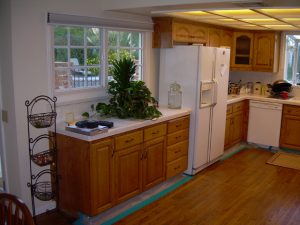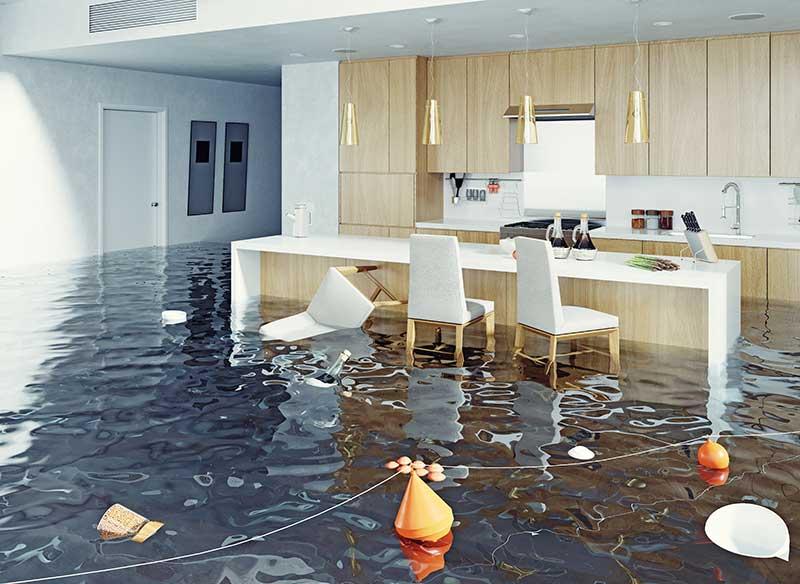Avoiding Water Damage in the Kitchen
Avoiding Water Damage in the Kitchen
Blog Article
What are your ideas about Most Common Causes of Residential Water Damage ?

The kitchen area is the space where a great deal of water task goes on. You can barely do anything without utilizing water in the kitchen area, from cooking, cleaning, and doing the dishes.
Thus, checking your kitchen from time to time is a necessity. This is because it has a higher opportunity of obtaining water damage as a result of the home appliances you utilize there.
When malfunctioning, these home appliances that manage water could make your kitchen unpleasant and also impact the structure of your building in the long run.
So, allow's take a look at some root causes of the water damage in the kitchen area and what you need to keep an eye out for.
Some Root Causes Of Water Damages in the Cooking area
These are a couple of reasons for water damage in the kitchen.
Faulty Drainpipe Water Lines
Drain Pipelines are needed parts of our houses, specifically in our kitchens and bathrooms. Nonetheless, they get damaged by getting obstructed, broken, and ruptured. Or worse, they can be mistakenly or loosely attached; whichever the situation may be, it can be a serious problem.
Damaged drain pipelines can trigger water damage and also, because of this, cause mold and mildew growth as well as injure the look of your wall surface. It can also make the afflicted location look untidy.
It is suggested always to inspect to make certain that all the pipes are in great problem and get an audio pipes system to maintain as well as deal with any problems.
Faulty Cooking Area Sink
The cooking area sink is an important as well as the majority of used part of the kitchen area. It is vulnerable to water damage; problems such as blocked pipes, leaking pipelines, and also damaged faucets.
These damages can be bothersome, specifically when one is active in the kitchen. It doesn't just happen without providing an idea or an indicator. Here are some indicators to know when your sink is not okay
So, these are the significant problems that can occur to your kitchen sink. However, one means to quit this damage is by ensuring that food fragments do not get involved in the pipelines. You are additionally inspecting the pipelines as well as faucets as well as ensuring that it is properly dealt with as well as in good condition.
Leaking Dishwasher
Dish washers make life in the kitchen area simpler. It is an optional kitchen device as well as, when readily available, can be a resource of water damage. In addition, like various other devices, it will certainly establish mistakes gradually, even with upkeep.
One of the mistakes is leaking via the door or below the dish washer. These faults create because of age, splits, wrong usage, loosened links to pipelines, etc.
Faults because of age come from continual usage. Therefore, the door leaks as a result of closing as well as opening.
Faults from the incorrect usage may create water damage by introducing fractures to it. Hence, it is recommended to adhere to the manual overview of the dishwasher to avoid this certain damage.
The leakages under the dishwasher can originate from splits in the gasket, hose, as well as loosened or incorrect link to pipes or drains.
This type of leakage usually goes unnoticed and also can be there for a long time. However, as a result of the time framework, it could trigger and also damage the floor mold development.
A lot more so, the longer the water remains, you will certainly notice the bending of the flooring where the dishwashing machine is. This is a great indicator to keep an eye out for when checking if your dishwasher leaks. Identifying as well as repairing this promptly avoids major water damage to your flooring.
Bottom Line
Looking out for problems in your cooking area can be tasking but necessary. It makes your work there easier and safer.
However, the causes listed above are only a few elements to think about, specifically if your cooking area has a lot of appliances.
Get a professional plumbing solution to come about as well as inspect for any type of damage and get them dealt with.
It makes your kitchen location damp as well as messy, specifically when leaking from the pipes. And if it is dripping from the tap, it leads to water waste.
It is an optional kitchen area appliance and, when readily available, can be a resource of water damage. A lot more so, the longer the water stays, you will see the bending of the floor where the dishwasher is. Detecting and also fixing this on time prevents serious water damage to your floor covering.
WAYS TO PROTECT YOUR KITCHEN FROM WATER DAMAGE
The kitchen is one of the most significant rooms in your house, as it is a multipurpose room wherein you can do your cooking and cleaning. Nowadays, homeowners tend to ignore the problems under their sink or appliances because of their busy schedules. However, most household floods occur due to plumbing and appliance failure. One of the most common scenarios that cause water damage to your kitchen is when the dishwasher malfunctions and floods gallons of water.
Water damage in your kitchen can cause several problems, including cosmetic damage, mold growth, and even an unpleasant smell. Often, if you fail to neglect the problem, there are always consequences. This article will help you protect your kitchen from water damage.
Common Causes of Water damage in your kitchen
Pipe problems are the most common source of water leaks under your sink. If homeowners ignore this issue, it will burst and flood the kitchen. Dishwasher leaks can be a source of water damage in your kitchen. An old, broken, and defective dishwasher can cause leaks, damage to your floor, and even mold growth. Refrigerator leaks can cause water damage in your kitchen, as sometimes melted ice from defrosting can cause leaks. Furthermore, if your refrigerator has internal problems, it is very likely to cause water damage. Back-splash and sink caulking can cause discoloration and water damage to your countertop tiles. Ways to Protect Your Kitchen From Water Damage
Regular maintenance
The most important thing you can do to protect your kitchen from water damage is to inspect the sinks, drains, and pipes, as well as the kitchen appliances, regularly. As with the sink, check for missing or deteriorated caulk. Remove the old caulk and clean the area thoroughly and re-seal it with fresh silicone. Furthermore, sweep the drain regularly, empty the filter and dispose of the debris in the garbage, and inspect the supply lines and valve for cracks.
Check your appliances
Check the user’s manual for instruction and proper use of every water-related appliance installed in your kitchen. For the dishwasher, check this procedure to prevent the dishwasher from flooding your kitchen. Check the appliances that need water, such as the coffee maker, ice maker, and water cooler, as they can become the cause of water damage in your kitchen. You may call a professional to check and repair damaged appliances and professional restoration for water damage clean-up.
Garbage clean-up
Fats, oil, and grease are common in the kitchen. Pouring them down the drain can cause clogs and sewage backup, which may result in significant kitchen water damage. If your kitchen sink is clogged, use a solution of hot water, baking soda, and vinegar to unclog the fats and oils in the pipes. Also, make sure to throw out the debris in the trash and clean the sink properly using paper towels for greases and oil and soap or bleach solution for the sink itself.
Shut off your water line
Make sure to shut off your main water line, especially if you're away and having some flood issue. As mentioned, dishwasher leaks are one of the most common culprits of water damage in the kitchen. So, make sure to only use the dishwasher if someone is at home and available to attend in case a problem arises.
Furthermore, it is also important that every member of your household knows where the shut-off valves are located. So in case of an emergency, they can mitigate the damage by turning off the water source.
Install leak detectors
One of the best ways to catch water damage before it could even cause serious damage to your home or business is by installing a water or leak detector. A leak detector monitors the flow of water through a pipeline, can detect moisture in the air for molds, and tracks the water temperature. Also, it can shut off your water line in case of an emergency. Install leak detectors under the kitchen sink, near the dishwasher and refrigerator.
https://superiorrestore.com/7-ways-to-protect-your-kitchen-from-water-damage/

We had been shown that article about Water Damage in Kitchen through a good friend on a different web blog. If you liked our article plz make sure you remember to pass it around. Thank you for going through it.
This Post Report this page